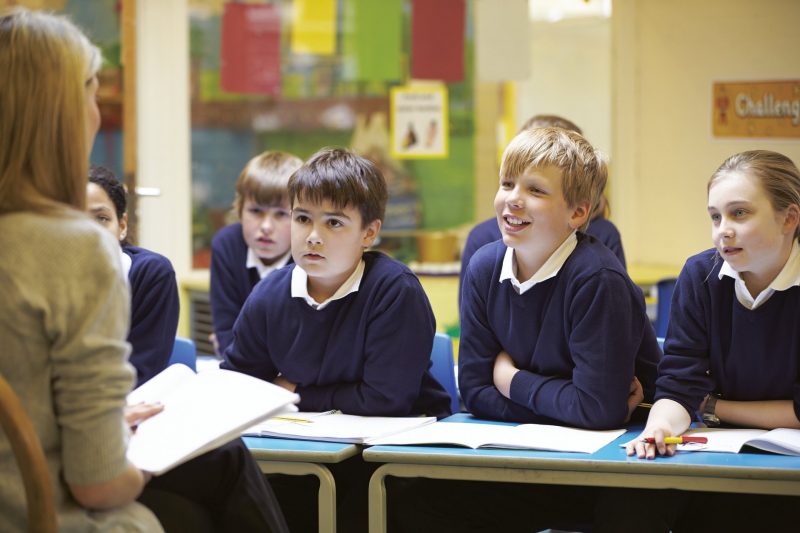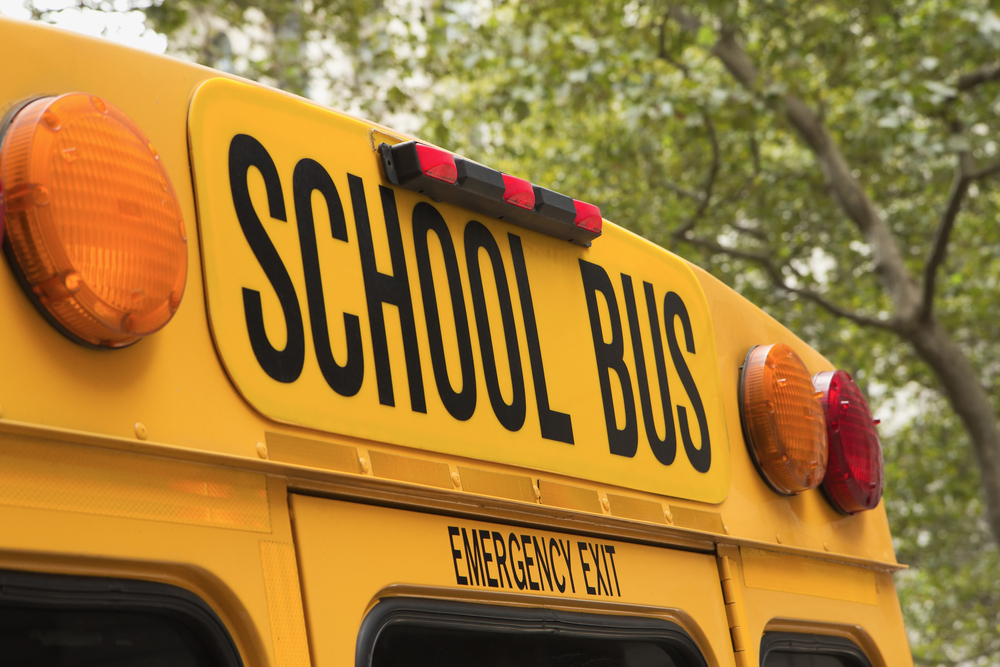Charter schools have quickly begun to take the place of private schools when parents are selecting a school for their children. This affordable option provides the benefits of private schools without the same drawbacks.
Charter schools are notorious for their individualized instruction, small class sizes, and being open to the public. If you are considering alternative options for your child’s education, charter schools are worth researching.
Although I love charter schools, there are a few downsides to them. It’s important to consider both the pros and cons of charter schools when you’re considering which education you would like for your little one.
What Are Charter Schools?
Charter schools often get thrown into the same category as private schools, but there are a few key differences that you’ll need to be aware of. Charter schools are independently operated public schools.
This means that they are independent of the public school system, and do not operate under the school district. However, they are still considered public schools.
Because of this, there are no entrance exams and you won’t have to pay tuition.
Charter School Pros Vs. Cons
Prices pulled from the Amazon Product Advertising API on:
Product prices and availability are accurate as of the date/time indicated and are subject to change. Any price and availability information displayed on [relevant Amazon Site(s), as applicable] at the time of purchase will apply to the purchase of this product.
Charter schools can be wonderful. They can also have a few drawbacks that will make you raise your eyebrows. My previous step-children used to attend a charter school.
I also carefully researched them for my children when opting away from the public school system during their elementary years. I opted for Catholic schools, but it wasn’t because I was against charter schools.
Instead, I simply appreciated the strong focus on morals and respect that went hand in hand with the Catholic school in our area. In fact, I discovered quite a few great things about charter schools.
Charter School Advantages
Charter schools take public schools and put their own unique twist on things to make sure that your children receive the best of both worlds.
They often have an application that has to be filled out, but usually accept almost anyone.
Charter Schools Offer Flexible Curriculum
Charter schools are considered public schools, and often have to meet testing requirements as public schools do, but develop their own charter with the state. This helps them set their own standard for student improvement.
Because they are not required to meet the same guidelines that other public schools are, they often have more flexibility in their curriculum than public schools, which is great for children who really need it.
Charter Schools Do Have To Follow State Regulations And Meet Expectations
Although they tend to differ from public schools, charter schools are still required to follow state regulations. They are also expected to meet certain academic expectations.
This doesn’t necessarily mean that the charter school in your area is meeting those expectations, but you can look up their academic achievement levels online and compare them to your other local schools.
Some states also close down underperforming charter schools to ensure that all children receive a quality education.
View in gallery
Smaller Class Sizes
Because fewer children attend charter schools than other public schools, there are typically smaller class sizes.
This means that your little one will more than likely get more one-on-one attention from the teacher, which equates to more learning.
They also might not have to deal with the large cliques in other schools because there are so few of them. Instead, your little one will have a close-knit atmosphere.
Charter Schools Provide A Better Education For Underprivileged Children
Almost half of the children that are in charter schools are from Latino or African American communities with schools that perform well below educational standards.
When children from these schools attend a charter school, they are more likely to receive a higher quality education than if they were to stay at their home school.
This gives underprivileged children a wonderful opportunity, as well as children that are still learning to speak English.
Studies repeatedly show that children in charter schools often perform better academically than their peers in the same demographic area that are attending public schools in a low-income area.
Smaller Administration
Since the school, overall, tends to be smaller than other schools, such as how they have smaller class sizes, you’ll also notice that they don’t have as many people in administrative positions as other schools.
You could walk in and meet the head person at the school the same day. This can be a wonderful thing if you ever have problems.
In public schools with large school districts, speaking with the superintendent requires jumping through quite a few hoops, and speaking with at least three different secretaries. You won’t go through that at a charter school.
The Cons Of Charter Schools
View in gallery
While there are plenty of great things about charter schools, there are plenty of not-so-great things you’ll need to keep in mind before enrolling your little one in a charter school.
They Get Less Funding Than Public And Private Schools
Charter schools that do receive funding from the state typically receive funding on a per-pupil basis. This means that the more children they have, the more funding they receive.
However, they also have to compete with larger school districts for funding as well. Unlike private schools, charter schools cannot charge tuition. This means that they receive thousands less in funding than those schools do.
This lack of funding can be seen in how much you have to pay for things, and in your child’s overall education.
Where public schools in a larger school district might be learning from an Ipad or Chromebook, your child might be learning from textbooks. Less funding usually equates to fewer resources for your child and the school overall.
Some charter schools make up for this by expecting the parents to pay for more things.
Whereas your child might get a free loaner laptop during the school year, a charter school might require you to be the one to buy your child items like this for educational purposes.
Although they cannot charge tuition, charter schools can, and often do, still charge school fees. These are typically more expensive than they are for other schools to make up for the lack of funding.
Charter Schools Are Less Likely To Work With Disabled Children
I ran into this problem with my youngest. She’s developmentally delayed. There are a few disorders. Behavioral problems are expected and being planned for when she finishes the transition to in-person learning.
Originally, she was set to attend a local Montessori school. This was the only school outside of public schools that would consider giving her a chance, and I spoke with every private and charter school in the area.
Now, they stated that they are no longer equipped to work with disabled children, and she is considered to have a disability. This means that we’re stuck with the public school in our district.
Charter schools can try to do that same thing. Here’s the main difference in charter schools compared to private schools, though. Private schools can refuse admission.
Charter schools are not allowed to refuse admission based on a disability because they are considered a public school. This makes it seem like they will work with you, but that’s not always the case.
They can, for example, simply not respond to an application. Or say they are not accepting students in that particular grade level.
Charter schools are quickly becoming known for violating IEP’s, excluding disabled children, and they tend to suspend and expel them at a faster rate than other pupils.
While they might not flat out refuse admission, they can still find a way to get around that little clause to get rid of your child. Keep in mind that not all charter schools are like this, but there are plenty of them that are.
If you have a disabled child and are considering enrolling them, take note of their attitude and do plenty of research.
View in gallery
Charter Schools Might Not Provide Transportation
Some charter schools will organize transportation through the primary public school district for children.
For example, a child can ride what would normally be their bus to their charter school, or at least close enough that they will be able to walk. Most charter schools do not provide their own transportation.
If it is not available via the primary public school district, parents will have to arrange their own transportation.
Uniforms Are More Likely To Be Worn
Most other public schools do not require uniforms, but charter schools tend to be the exception. Some of them allow children to wear what they please as long as they follow a dress code. Others have a uniform policy.
This can be a good or bad thing. Uniforms can be expensive, especially for parents that don’t buy new school clothes every year.
They can also be a hassle if your child tends to go through a lot of clothing due to wear and tear.
Teachers Are Not Always Required To be Certified
Larger public school districts require that teachers have the proper education to teach your little one. Charter schools do not always have those same standards.
Some do not require that teachers have any type of certification or education. This can be concerning. Keep in mind that this does not apply to all charter schools, so you will need to ask the school that you have in mind.
Schools Are Shut Down For Underperformance
Charter schools must operate under their charter. This is what details their specific goals for their students, how they will achieve them, and how they will measure them.
It is required that the charter be approved before the school is even allowed to open. Then, this same charter is used when evaluating the school.
After the school is evaluated, which may happen yearly, some schools are no longer authorized to be a school due to severe underperformance.
While it’s good that children will be receiving a quality education, the sudden closure of schools can be distressing for both parents and children.
Some Believe That Charter Schools Promote Segregation
Whereas there is the argument that charter schools provide a much needed opportunity for underprivileged children, some counter that argument with the one that charter schools do this by promoting segregation.
Since a larger portion of charter schools consists of non-white pupils, such as children from the Latino community or those that do not speak English yet, some parents feel that those children are being separated from the others.
While this is not my personal opinion, there are a lot of parents that feel this way. Before you make the decision to enroll your little one in a charter school, it’s important to decide where you stand on this issue.
Keep in mind when deciding that charter schools are a choice, so that does tend to take away the dark implications of the word segregation that so many of us think of.
View in gallery
In Conclusion
Charter schools offer a wide array of both pros and cons. The primary disadvantage that you will see repeatedly is that there are fewer resources for the children than they will receive at other schools.
In some situations, this might be worth the higher quality education. However, there are key advantages that you also have to consider. Keep them both in mind before choosing where to enroll your child.
It’s also important to keep in mind that all schools are different.
While the charter schools in my area might ignore applications or not want to work with disabled children, the ones in your area might welcome a disabled child with open arms.
Charter schools are all different, especially in different areas. While you’re making your decision, be sure to take a good look at the schools available in your area. Then, decide what is best for your child.






